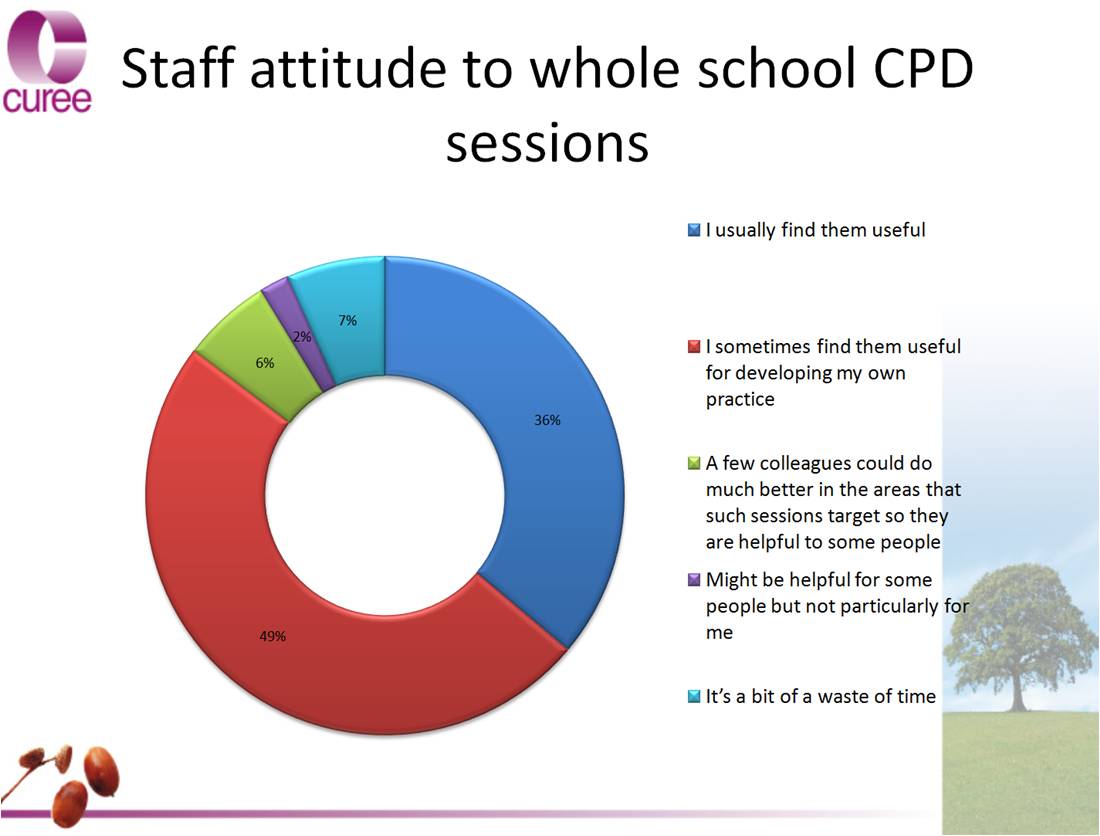We are of course well aware of the need for planning classroom activities that cater for the requirements of different groups of pupils, but to what extent do we differentiate CPD? While recent research undertaken with the help of CUREE has highlighted the importance of personalising CPD, in-depth evidence from schools shows that there is still a need for further development.
The Developing Great Teaching: lessons from the international reviews into effective professional development report, published by The Teacher Development Trust, was launched earlier this year. Written by a team of researchers that included our own CEO Philippa Cordingley, lead author of the Sutton Trust Toolkit Steve Higgins and other colleagues from Durham University, CUREE and UCL, the report highlights the importance of recognising that teachers (just like pupils) have different starting points. However CUREE's in-depth Skein evidence from the professional learning environments of 28 schools shows that this can be challenging. The Skein process involves evaluating a school's professional learning environment by analysing school documentation, survey results, responses from a focus group and interviews involving a range of colleagues. So what does this evidence tell us about differentiation?

It highlights that:
- Whole school CPD is a frequent component of many teachers' CPD 'diet'. Whilst it is of course possible to differentiate whole school sessions we know that this often doesn't happen and that only 36% of colleagues reported usually finding them useful for developing their practice.
- Whilst some colleagues are able to participate in activities that lend themselves to differentiation such as coaching, action planning and collaborative research many colleagues don't get these opportunities. For example, 358 colleagues reported never having participated in action research or enquiry based practices.
- For many colleagues, their sole experience of CPD is internal mentoring from their SLT or a more experienced colleague - staff reporting almost a half of their regular CPD provision being delivered by a more experienced colleague and 268 never having experienced formal or accredited training in their school.
- Despite reports such as Developing Great Teaching evidencing that the most effective CPD 'diets' consist of multiple and varied processes, many colleagues report a narrow range of provision and none of the available provisions are offered to all staff.
So what does this mean? As a school you may well want to think about the extent to which you identify and cater for different starting points. This may involve;
- reviewing your use of whole school CPD;
- introducing coaching as a tool to help colleagues take an active role in differentiating their own professional learning;
- developing enquiry/action research (eg. through RLS) to allow colleagues to pursue their own personal development priorities, and;
- making use of external and accredited training opportunities to support existing peer support and learning models, so as to offer colleagues the chance to engage with fresh CPD processes and diversify their range of CPD provision.
You can see how effectively your own CPD provision caters for differentiation, as well as what you can do to improve your overall CPD offering, through a Skein visit for your school or by contacting Rebecca Raybould. More information about CUREE and our work supporting evidence and research informed learning practices can be found through our website, Twitter, or by contacting Joe Askew.
